人教版(2019)必修第三册Unit 3 Diverse Cultures Discovering Useful Structures 课件(共37张PPT)
文档属性
| 名称 | 人教版(2019)必修第三册Unit 3 Diverse Cultures Discovering Useful Structures 课件(共37张PPT) | 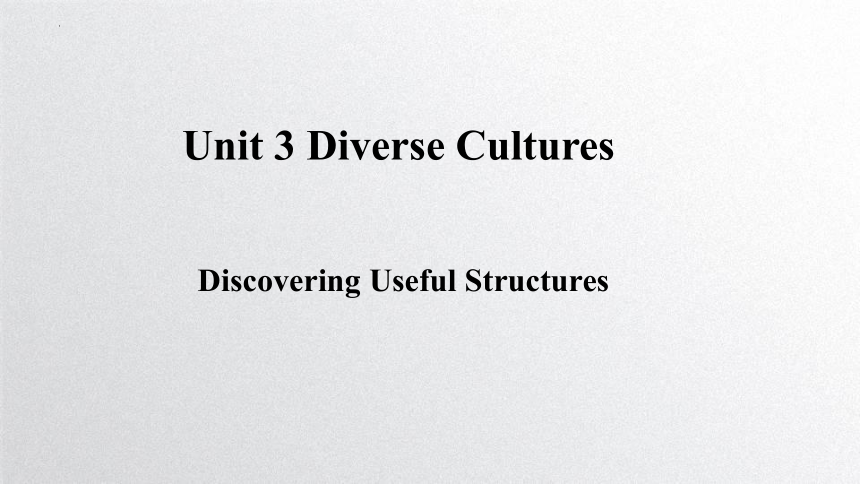 | |
| 格式 | pptx | ||
| 文件大小 | 1.0MB | ||
| 资源类型 | 教案 | ||
| 版本资源 | 人教版(2019) | ||
| 科目 | 英语 | ||
| 更新时间 | 2024-05-20 11:40:19 | ||
图片预览

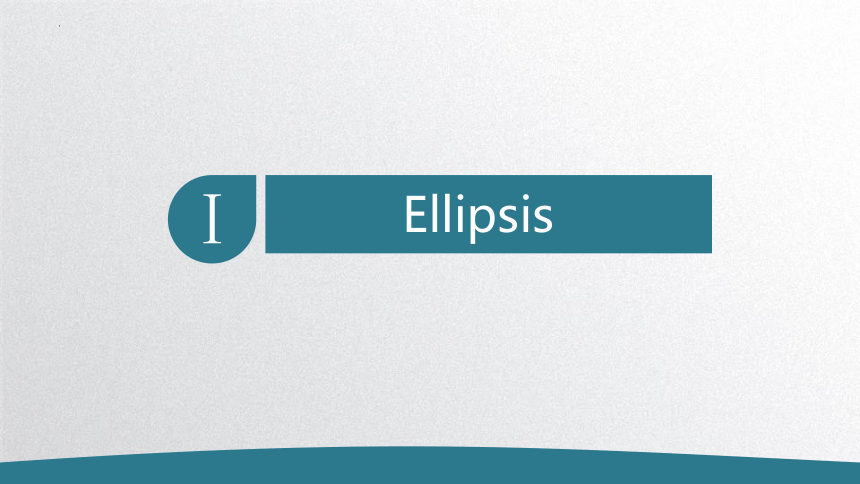
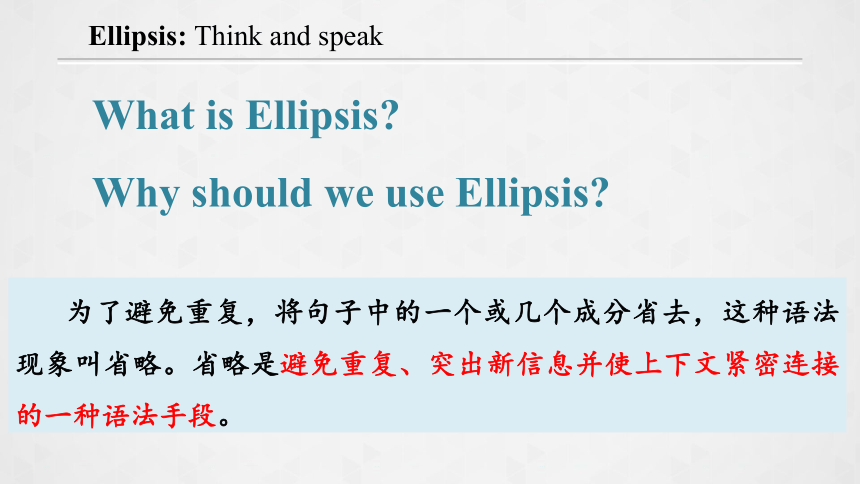
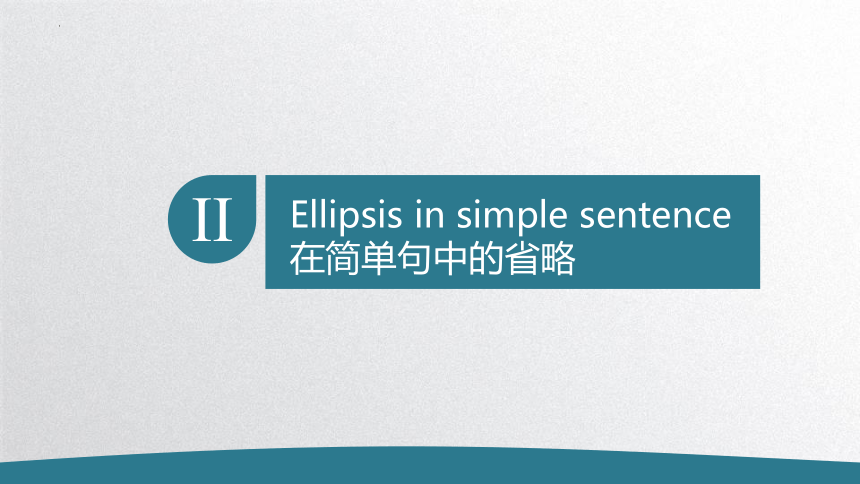
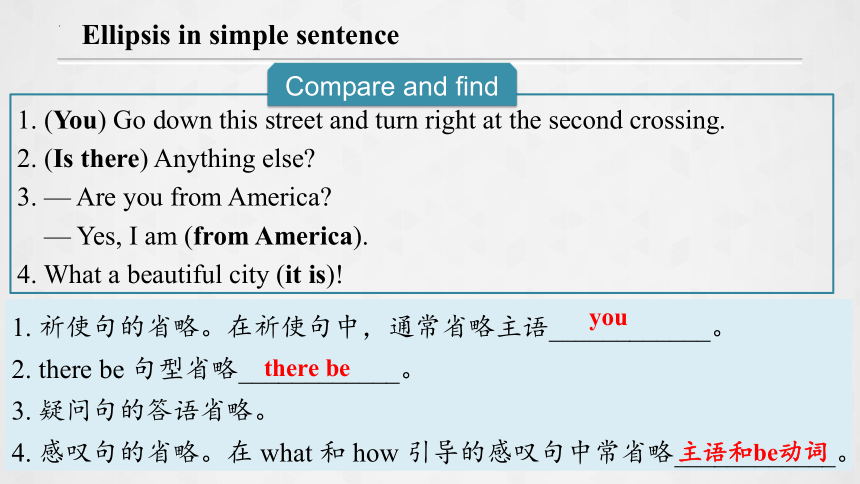
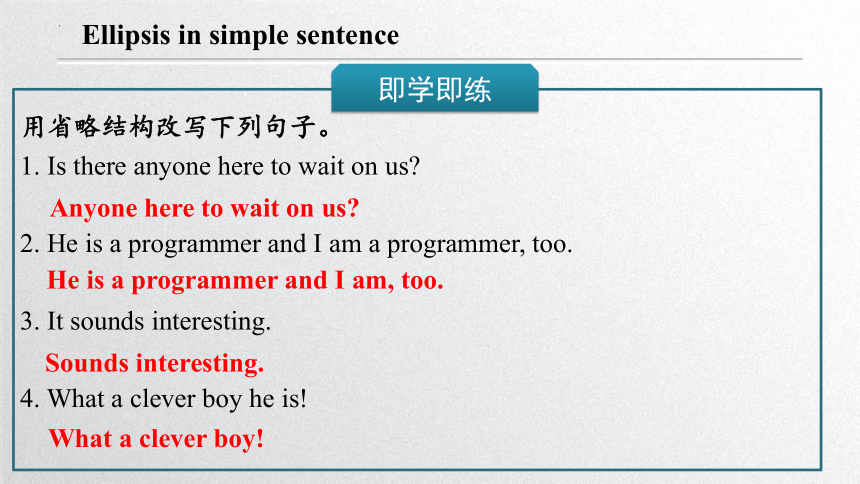


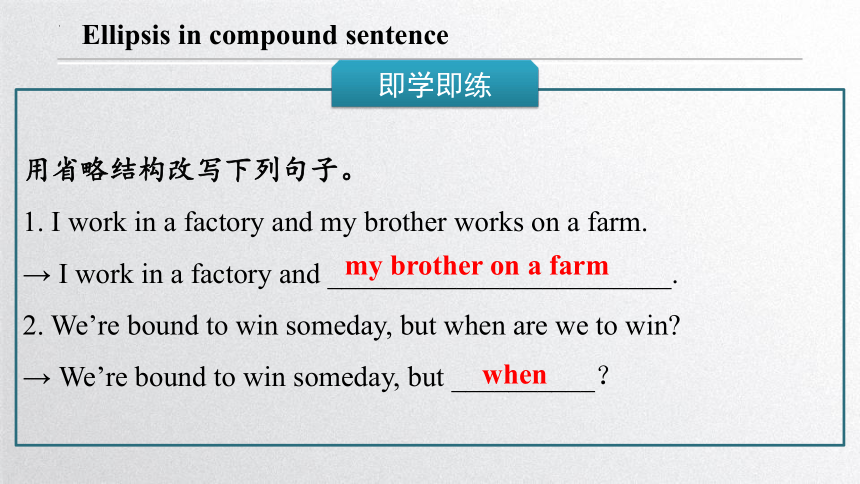

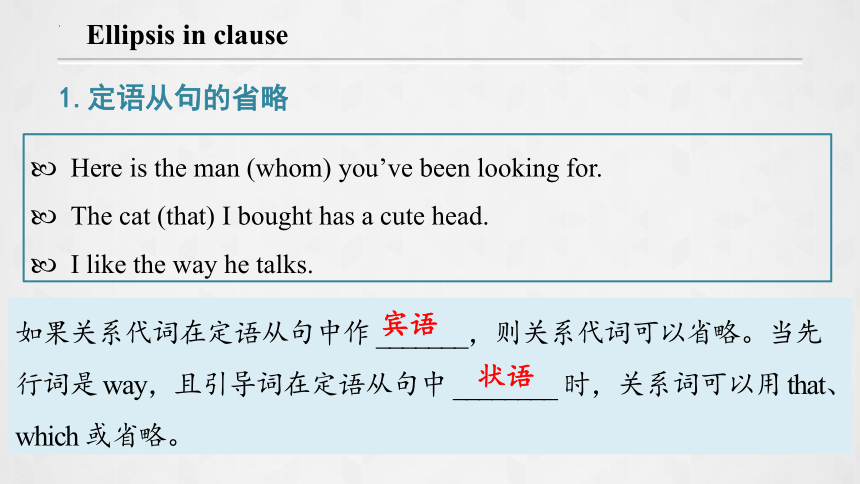
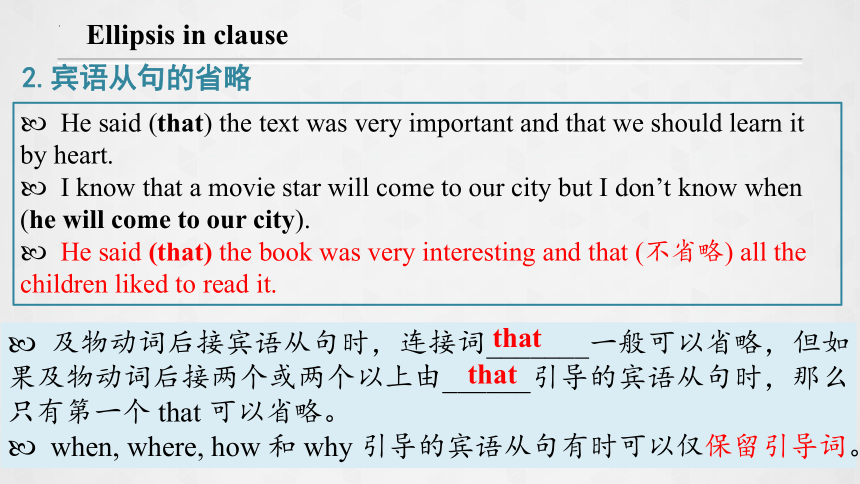
文档简介
(共37张PPT)
Discovering Useful Structures
Unit 3 Diverse Cultures
Ⅰ
Ellipsis
Ellipsis: Think and speak
What is Ellipsis
Why should we use Ellipsis
为了避免重复,将句子中的一个或几个成分省去,这种语法现象叫省略。省略是避免重复、突出新信息并使上下文紧密连接的一种语法手段。
II
Ellipsis in simple sentence
在简单句中的省略
1. (You) Go down this street and turn right at the second crossing.
2. (Is there) Anything else
3. — Are you from America
— Yes, I am (from America).
4. What a beautiful city (it is)!
1. 祈使句的省略。在祈使句中,通常省略主语____________。
2. there be 句型省略____________。
3. 疑问句的答语省略。
4. 感叹句的省略。在 what 和 how 引导的感叹句中常省略____________。
Ellipsis in simple sentence
you
there be
主语和be动词
Compare and find
用省略结构改写下列句子。
1. Is there anyone here to wait on us
2. He is a programmer and I am a programmer, too.
3. It sounds interesting.
4. What a clever boy he is!
即学即练
Ellipsis in simple sentence
Anyone here to wait on us
He is a programmer and I am, too.
Sounds interesting.
What a clever boy!
Ellipsis in compound sentence
在并列句中的省略
Ⅲ
1.Tom picked up the book from the floor and (Tom) handed it to his brother.
2. His performance made us amused, but (his performance made) himself tired.
3. Xiaoming must have been playing football at that time,and his sister (must have been) playing the piano.
Ellipsis in compound sentence
1. 省略共同的______或宾语。
2. 若主语与谓语相同,则省略后面的______成分。
3. 若主语不同,而谓语部分的系动词、助动词或情态动词_________,则省略后面的系动词、助动词或情态动词。
主语
主谓
相同
Compare and find
用省略结构改写下列句子。
1. I work in a factory and my brother works on a farm.
→ I work in a factory and ________________________.
2. We’re bound to win someday, but when are we to win
→ We’re bound to win someday, but __________?
即学即练
my brother on a farm
when
Ellipsis in compound sentence
Ellipsis in clause
从句中的省略
Ⅳ
1.定语从句的省略
Here is the man (whom) you’ve been looking for.
The cat (that) I bought has a cute head.
I like the way he talks.
如果关系代词在定语从句中作 _______,则关系代词可以省略。当先行词是 way,且引导词在定语从句中 ________ 时,关系词可以用 that、which 或省略。
Ellipsis in clause
宾语
状语
2.宾语从句的省略
He said (that) the text was very important and that we should learn it by heart.
I know that a movie star will come to our city but I don’t know when (he will come to our city).
He said (that) the book was very interesting and that (不省略) all the children liked to read it.
Ellipsis in clause
及物动词后接宾语从句时,连接词_______一般可以省略,但如果及物动词后接两个或两个以上由______引导的宾语从句时,那么只有第一个 that 可以省略。
when, where, how 和 why 引导的宾语从句有时可以仅保留引导词。
that
that
3.状语从句的省略
When (the novel is) published, the novel will become one of the best sellers of the year.
Though (they were) tired, they went on working.
He did as (he was) told.
He stood up as if (he were) to say something.
Unless (it is) necessary, you’d better not refer to the dictionary.
Ellipsis in clause
当when, while, if, as if, though, as, until, unless 等连接的状语从句的主语和主句的主语一致,且状语从句中含有 be 动词或从句的主语为 it 时,省略状语从句中的 ______________。
在 than, as 等引导的 __________ 状语从句中常省略某些成分。
主语和 be 动词
比较
用省略结构改写下列复合句。
1. Who is the man whom you were talking to
→ Who is the man ________________________
2. Someone has used my mobile phone, but I don’t know who has used it.
→ Someone has used my mobile phone, but I don’t know ______.
3. When it is heated, a piece of ice will turn into water.
→ ________________, a piece of ice will turn into water.
you were talking to
who
When heated
Ellipsis in clause
即学即练
4. Although he was hard-working, he couldn’t earn enough to support himself.
→ _____________________, he couldn’t earn enough to support himself.
5. He’s the man that you can safely depend on.
→ He’s the man ________________________.
6. They don’t use more water than it is necessary.
→ They don’t use more water _______________.
Although hard-working
you can safely depend on
than necessary
Ellipsis in clause
即学即练
Ellipsis in subjunctive mood
虚拟语气的省略
V
1. We insisted that they (should) go with us.
2. It is necessary that we (should) learn more words by heart.
3. Had you come here yesterday, you would have met her.
4. Were I you, I would take his advice.
5. Should there be a letter for me, please keep it in the drawer.
Ellipsis in subjunctive mood
在一坚持 (insist),二命令 (order, command),三建议 (suggest, propose, advise),四要求 (demand, require, request, desire) 等后的宾语从句中,含这些词的派生词的其他主语从句、同位语从句、表语从句,以及 It is strange / natural / necessary / important that ... 从句中常省略 ____________。
虚拟条件句常省略 ______,将 were, had, should 提前构成部分倒装。
if
should
Compare and find
用省略结构改写下列各句。
1. If she were here, she would agree too.
→ __________________, she would agree too.
2. He ordered that we should go out at once.
→ He ordered that ____________________.
3. If Thomas Edison had stored his money, he would have died a wealthy man.
→ _________________________________, he would have died a wealthy man.
Were she here
we go out at once
Had Thomas Edison stored his money
Ellipsis in subjunctive mood
即学即练
Ellipsis in other situations
VI
1.动词不定式的省略
1. — Will you go with me
— Well, I’d like to (go with you).
2. He didn’t come, but he ought to have (come).
3. I saw him enter the room just now.
= He was seen to enter the room just now by me.
Ellipsis in other situations
有些动词 (词组),如want, wish, expect, hope, would like, try, forget等后面的不定式作______时,为了避免重复,可以省略动词只保留到 _____,但如果在省略的不定式结构中含有系动词 be 和助动词 have,这些动词就要保留。
感官动词 (词组), see, look at, hear, listen to, notice, watch 等和使役动词 make, let, have 等的后面作宾补的不定式要省略 _____;但此类动词用于被动语态时 to 不可省略。
宾语
to
to
1.动词不定式的省略
4. She’d like to take off her coat and have a break.
5. It’s more difficult to do than to say.
做比说难(强调语意前后对比)。
Ellipsis in other situations
在某些句式中,如介词 but,except 前有动词 do 的任何形式,后面的不定式要省略______。
两个或两个以上的不定式并列时,第一个带to,后面省去_____;但如果两个不定式表示对比、对照关系时,则to不可省略。
to
to
2. 介词的省略
1. She spends half an hour (in) doing some reading every day.
2. We have a final exam (in) every term.
3. There is no sense / point (in) doing sth.
4. It is no good / use (in) doing sth.
5. I have trouble understanding this problem.
Ellipsis in other situations
在英语中,一些与动词、名词、形容词搭配的______常被省略,只保留后面的动名词。如 spend time / money (in) doing sth; have difficulty / trouble (in) doing sth; prevent / stop sb (from) doing sth。
表示______的介词 at, on 和 in 在 next, last, this, each, these, yesterday, every, tomorrow 等词之前,一般可以省略。
介词
时间
3. 替代性省略
— Can they finish their work today
— I think so.
— I don’t think so. / I think not.
Ellipsis in other situations
英语中,可以使用so, _____或其他手段来省略上文或问句中的一部分或整个句子。
not
Tips: hope, guess, be afraid 的否定形式只能用 not 的形式,不能用not ... so 的形式。
— The boys are not doing a good job at all, are they
— I guess not.
4. 比较结构的省略
The sooner (you do it), the better (it will be).
(你做得)越快(结果就会)越好。
Many others are doing better than we are (doing).
Ellipsis in other situations
在“the + 比较级,the + 比较级”结构中和由_________和as引导的比较句式中,常会有一些成分在上下文清楚的情况下被省略。
than
Page 30
Activity 1 Read the following sentences and find the words that have been omitted to avoid repetition.
1 A: Oh, I just love nachos! Mexican corn chips covered in cheese!
B: Me, too.
A: Oh, I just love nachos! They are Mexican corn chips covered in cheese!
B: I love nachos, too.
2 A: So it’s the food of many different cultures, all in one dish
B: Exactly.
A: So it’s the food of many different cultures, and they are all in one dish
B: Exactly, it’s the food of many different cultures, and they are all in one dish.
3 A real mix of cultures here!
There is a real mix of cultures here!
4 Can’t wait!
I can’t wait to go there!
Activity 2 Rewrite the sentence by taking out the unnecessary parts.
1 You mean you are planning a trip across the Atlantic for
a holiday It sounds like a good idea.
You mean you are planning a trip across the Atlantic for
a holiday Good idea.
2 He tried to solve his financial problems, but he couldn’t
solve the problems.
He tried to solve his financial problems, but couldn’t.
3 If it is necessary, I’ll finish my report on American poetry as soon as it is possible.
If necessary, I’ll finish my report on American poetry as soon as possible.
4 Are you going to dress like that Wearing a dress might be better than wearing jeans and boots.
Are you going to dress like that A dress might be better than jeans and boots.
5 Some wild mushrooms are poisonous and some are not poisonous.
Some wild mushrooms are poisonous and some are not.
6 I really like that paper folding book, and my son likes that paper folding book, too.
I really like that paper folding book, and my son, too.
Activity 3
Justin: Linlin, I’m going to Guizhou Province next month.
I’m super excited! Any recommendations for places to visit
Linlin: Wow, cool! Guizhou is a province with a lot of cultural diversity. Places to visit... well, definitely the Huangguoshu Waterfall first.
Justin: What’s special about the waterfall
Linlin: Well, have you ever heard of the Chinese novel Journey to the West
Justin: Yes, I have.Why
Linlin: In the back of the waterfall, you will find a cave, which is the home of the Monkey King.
Justin: Really Cool! I’ll definitely check it out.
Linlin: And I strongly recommend the ethnic minority villages. You’ll find Chinese culture is much more diverse than you thought.
Justin: Sounds great, thanks!
Activity 3
Justin: Linlin, I’m going to Guizhou Province next month.
I’m super excited! Any recommendations for places to visit
Justin: Linlin, I’m going to Guizhou Province next month.
I’m super excited! Do you have any recommendations for places to visit in Guizhou Province
Linlin: Wow, cool! Guizhou is a province with a lot of cultural diversity. Places to visit... well, definitely the Huangguoshu Waterfall first.
Linlin: Wow, that’s cool! Guizhou is a province with a lot of cultural diversity. What are some places to visit in Guizhou Well, definitely the Huangguoshu Waterfall is the first place to visit in Guizhou Province.
Justin: What’s special about the waterfall
Linlin: Well, have you ever heard of the Chinese novel Journey to the West
Justin: Yes, I have.Why
Justin: Yes, I have heard of the Chinese novel Journey to the West.
Why do you ask if I have heard of the Chinese novel Journey to the West
Linlin: In the back of the waterfall, you will find a cave, which is the home of the Monkey King.
Linlin: In the back of the Huangguoshu Waterfall, you will find a cave, which is the home of the Monkey King from Journey to the West.
Justin: Really Cool! I’ll definitely check it out.
Justin: That’s really true It’s cool! I’ll definitely check it out.
Linlin: And I strongly recommend the ethnic minority villages. You’ll find Chinese culture is much more diverse than you thought.
Linlin: And I strongly recommend the ethnic minority villages on your trip to Guizhou Province. You’ll find Chinese culture is much more diverse than you thought it was.
Justin: Sounds great, thanks!
Justin: This all sounds great. Thanks!
Book 3 Unit 3
WB: Using Structures
(P74)
Ex1 Read these sentences. In pairs, decide which words can be left out.
1. A: How can we make Italian vegetable soup
B: I don’t know how we can make it.
B: I don’t know (how we can make it).
2. A: When did you get to Florence
B: I got to Florence yesterday.
B: (I got to Florence) yesterday.
3. A: Are you a student of English literature
B: No, though I wish I were a student of English literature.
B: No, though I wish I were (a student of English literature).
4. A: Did he go to Egypt
B: He said he would go, but he didn’t go.
B: He said he would (go), but (he) didn’t (go).
5. A: Would you like to try on this pair of jeans
B: Yes, I would like to try on that pair of jeans.
B: Yes, I would like to (try on that pair of jeans).
Ex 2 Match the questions to the most likely answers. Notice how ellipsis is used in the answers.
1. Do you think it’s going to rain this afternoon
C. I hope not.
2. We were quite surprised after we saw the paintings in the gallery.
A. Why so
3. Will you join our trip to South Africa
F. I’d love to.
4. Will the flight to Rome take off on time
D. I’m afraid not.
5. Would you mind using a diagram to explain these percentages to me
B. Not at all.
6. Has Lily ever been to the Louvre Museum
E. Maybe not.
A. Why so
B. Not at all.
C. I hope not.
D. I’m afraid not.
E. Maybe not.
F. I’d love to.
Ex 3 Ellipsis is often used in public signs, headlines, diaries, notes, or informal letters. Rewrite these sentences using ellipsis.
1. Taking photos is not allowed here.
= No photos.禁止拍照
2. You should not walk on the grass.
=Keep off the grass勿踩草地
3. There will be roadworks ahead.
= Roadworks ahead.前方道路施工
4. There may be children crossing the road ahead.
=Children crossing ahead.前方儿童横穿马路
5. The sooner it happens, the better it will be.
=The sooner, the better.越快越好
6. A millionaire was poisoned in his home in Beverly Hills.
=Millionaire poisoned 百万富翁中毒
7. The plane crash in Colorado last wek claimed 15 lives.
=Plane crash claimed 15 lives飞机坠毁 15人丧生
8. There is an exhibition of fine china at the museum.
=Exhibition of fine china精品瓷器展
Discovering Useful Structures
Unit 3 Diverse Cultures
Ⅰ
Ellipsis
Ellipsis: Think and speak
What is Ellipsis
Why should we use Ellipsis
为了避免重复,将句子中的一个或几个成分省去,这种语法现象叫省略。省略是避免重复、突出新信息并使上下文紧密连接的一种语法手段。
II
Ellipsis in simple sentence
在简单句中的省略
1. (You) Go down this street and turn right at the second crossing.
2. (Is there) Anything else
3. — Are you from America
— Yes, I am (from America).
4. What a beautiful city (it is)!
1. 祈使句的省略。在祈使句中,通常省略主语____________。
2. there be 句型省略____________。
3. 疑问句的答语省略。
4. 感叹句的省略。在 what 和 how 引导的感叹句中常省略____________。
Ellipsis in simple sentence
you
there be
主语和be动词
Compare and find
用省略结构改写下列句子。
1. Is there anyone here to wait on us
2. He is a programmer and I am a programmer, too.
3. It sounds interesting.
4. What a clever boy he is!
即学即练
Ellipsis in simple sentence
Anyone here to wait on us
He is a programmer and I am, too.
Sounds interesting.
What a clever boy!
Ellipsis in compound sentence
在并列句中的省略
Ⅲ
1.Tom picked up the book from the floor and (Tom) handed it to his brother.
2. His performance made us amused, but (his performance made) himself tired.
3. Xiaoming must have been playing football at that time,and his sister (must have been) playing the piano.
Ellipsis in compound sentence
1. 省略共同的______或宾语。
2. 若主语与谓语相同,则省略后面的______成分。
3. 若主语不同,而谓语部分的系动词、助动词或情态动词_________,则省略后面的系动词、助动词或情态动词。
主语
主谓
相同
Compare and find
用省略结构改写下列句子。
1. I work in a factory and my brother works on a farm.
→ I work in a factory and ________________________.
2. We’re bound to win someday, but when are we to win
→ We’re bound to win someday, but __________?
即学即练
my brother on a farm
when
Ellipsis in compound sentence
Ellipsis in clause
从句中的省略
Ⅳ
1.定语从句的省略
Here is the man (whom) you’ve been looking for.
The cat (that) I bought has a cute head.
I like the way he talks.
如果关系代词在定语从句中作 _______,则关系代词可以省略。当先行词是 way,且引导词在定语从句中 ________ 时,关系词可以用 that、which 或省略。
Ellipsis in clause
宾语
状语
2.宾语从句的省略
He said (that) the text was very important and that we should learn it by heart.
I know that a movie star will come to our city but I don’t know when (he will come to our city).
He said (that) the book was very interesting and that (不省略) all the children liked to read it.
Ellipsis in clause
及物动词后接宾语从句时,连接词_______一般可以省略,但如果及物动词后接两个或两个以上由______引导的宾语从句时,那么只有第一个 that 可以省略。
when, where, how 和 why 引导的宾语从句有时可以仅保留引导词。
that
that
3.状语从句的省略
When (the novel is) published, the novel will become one of the best sellers of the year.
Though (they were) tired, they went on working.
He did as (he was) told.
He stood up as if (he were) to say something.
Unless (it is) necessary, you’d better not refer to the dictionary.
Ellipsis in clause
当when, while, if, as if, though, as, until, unless 等连接的状语从句的主语和主句的主语一致,且状语从句中含有 be 动词或从句的主语为 it 时,省略状语从句中的 ______________。
在 than, as 等引导的 __________ 状语从句中常省略某些成分。
主语和 be 动词
比较
用省略结构改写下列复合句。
1. Who is the man whom you were talking to
→ Who is the man ________________________
2. Someone has used my mobile phone, but I don’t know who has used it.
→ Someone has used my mobile phone, but I don’t know ______.
3. When it is heated, a piece of ice will turn into water.
→ ________________, a piece of ice will turn into water.
you were talking to
who
When heated
Ellipsis in clause
即学即练
4. Although he was hard-working, he couldn’t earn enough to support himself.
→ _____________________, he couldn’t earn enough to support himself.
5. He’s the man that you can safely depend on.
→ He’s the man ________________________.
6. They don’t use more water than it is necessary.
→ They don’t use more water _______________.
Although hard-working
you can safely depend on
than necessary
Ellipsis in clause
即学即练
Ellipsis in subjunctive mood
虚拟语气的省略
V
1. We insisted that they (should) go with us.
2. It is necessary that we (should) learn more words by heart.
3. Had you come here yesterday, you would have met her.
4. Were I you, I would take his advice.
5. Should there be a letter for me, please keep it in the drawer.
Ellipsis in subjunctive mood
在一坚持 (insist),二命令 (order, command),三建议 (suggest, propose, advise),四要求 (demand, require, request, desire) 等后的宾语从句中,含这些词的派生词的其他主语从句、同位语从句、表语从句,以及 It is strange / natural / necessary / important that ... 从句中常省略 ____________。
虚拟条件句常省略 ______,将 were, had, should 提前构成部分倒装。
if
should
Compare and find
用省略结构改写下列各句。
1. If she were here, she would agree too.
→ __________________, she would agree too.
2. He ordered that we should go out at once.
→ He ordered that ____________________.
3. If Thomas Edison had stored his money, he would have died a wealthy man.
→ _________________________________, he would have died a wealthy man.
Were she here
we go out at once
Had Thomas Edison stored his money
Ellipsis in subjunctive mood
即学即练
Ellipsis in other situations
VI
1.动词不定式的省略
1. — Will you go with me
— Well, I’d like to (go with you).
2. He didn’t come, but he ought to have (come).
3. I saw him enter the room just now.
= He was seen to enter the room just now by me.
Ellipsis in other situations
有些动词 (词组),如want, wish, expect, hope, would like, try, forget等后面的不定式作______时,为了避免重复,可以省略动词只保留到 _____,但如果在省略的不定式结构中含有系动词 be 和助动词 have,这些动词就要保留。
感官动词 (词组), see, look at, hear, listen to, notice, watch 等和使役动词 make, let, have 等的后面作宾补的不定式要省略 _____;但此类动词用于被动语态时 to 不可省略。
宾语
to
to
1.动词不定式的省略
4. She’d like to take off her coat and have a break.
5. It’s more difficult to do than to say.
做比说难(强调语意前后对比)。
Ellipsis in other situations
在某些句式中,如介词 but,except 前有动词 do 的任何形式,后面的不定式要省略______。
两个或两个以上的不定式并列时,第一个带to,后面省去_____;但如果两个不定式表示对比、对照关系时,则to不可省略。
to
to
2. 介词的省略
1. She spends half an hour (in) doing some reading every day.
2. We have a final exam (in) every term.
3. There is no sense / point (in) doing sth.
4. It is no good / use (in) doing sth.
5. I have trouble understanding this problem.
Ellipsis in other situations
在英语中,一些与动词、名词、形容词搭配的______常被省略,只保留后面的动名词。如 spend time / money (in) doing sth; have difficulty / trouble (in) doing sth; prevent / stop sb (from) doing sth。
表示______的介词 at, on 和 in 在 next, last, this, each, these, yesterday, every, tomorrow 等词之前,一般可以省略。
介词
时间
3. 替代性省略
— Can they finish their work today
— I think so.
— I don’t think so. / I think not.
Ellipsis in other situations
英语中,可以使用so, _____或其他手段来省略上文或问句中的一部分或整个句子。
not
Tips: hope, guess, be afraid 的否定形式只能用 not 的形式,不能用not ... so 的形式。
— The boys are not doing a good job at all, are they
— I guess not.
4. 比较结构的省略
The sooner (you do it), the better (it will be).
(你做得)越快(结果就会)越好。
Many others are doing better than we are (doing).
Ellipsis in other situations
在“the + 比较级,the + 比较级”结构中和由_________和as引导的比较句式中,常会有一些成分在上下文清楚的情况下被省略。
than
Page 30
Activity 1 Read the following sentences and find the words that have been omitted to avoid repetition.
1 A: Oh, I just love nachos! Mexican corn chips covered in cheese!
B: Me, too.
A: Oh, I just love nachos! They are Mexican corn chips covered in cheese!
B: I love nachos, too.
2 A: So it’s the food of many different cultures, all in one dish
B: Exactly.
A: So it’s the food of many different cultures, and they are all in one dish
B: Exactly, it’s the food of many different cultures, and they are all in one dish.
3 A real mix of cultures here!
There is a real mix of cultures here!
4 Can’t wait!
I can’t wait to go there!
Activity 2 Rewrite the sentence by taking out the unnecessary parts.
1 You mean you are planning a trip across the Atlantic for
a holiday It sounds like a good idea.
You mean you are planning a trip across the Atlantic for
a holiday Good idea.
2 He tried to solve his financial problems, but he couldn’t
solve the problems.
He tried to solve his financial problems, but couldn’t.
3 If it is necessary, I’ll finish my report on American poetry as soon as it is possible.
If necessary, I’ll finish my report on American poetry as soon as possible.
4 Are you going to dress like that Wearing a dress might be better than wearing jeans and boots.
Are you going to dress like that A dress might be better than jeans and boots.
5 Some wild mushrooms are poisonous and some are not poisonous.
Some wild mushrooms are poisonous and some are not.
6 I really like that paper folding book, and my son likes that paper folding book, too.
I really like that paper folding book, and my son, too.
Activity 3
Justin: Linlin, I’m going to Guizhou Province next month.
I’m super excited! Any recommendations for places to visit
Linlin: Wow, cool! Guizhou is a province with a lot of cultural diversity. Places to visit... well, definitely the Huangguoshu Waterfall first.
Justin: What’s special about the waterfall
Linlin: Well, have you ever heard of the Chinese novel Journey to the West
Justin: Yes, I have.Why
Linlin: In the back of the waterfall, you will find a cave, which is the home of the Monkey King.
Justin: Really Cool! I’ll definitely check it out.
Linlin: And I strongly recommend the ethnic minority villages. You’ll find Chinese culture is much more diverse than you thought.
Justin: Sounds great, thanks!
Activity 3
Justin: Linlin, I’m going to Guizhou Province next month.
I’m super excited! Any recommendations for places to visit
Justin: Linlin, I’m going to Guizhou Province next month.
I’m super excited! Do you have any recommendations for places to visit in Guizhou Province
Linlin: Wow, cool! Guizhou is a province with a lot of cultural diversity. Places to visit... well, definitely the Huangguoshu Waterfall first.
Linlin: Wow, that’s cool! Guizhou is a province with a lot of cultural diversity. What are some places to visit in Guizhou Well, definitely the Huangguoshu Waterfall is the first place to visit in Guizhou Province.
Justin: What’s special about the waterfall
Linlin: Well, have you ever heard of the Chinese novel Journey to the West
Justin: Yes, I have.Why
Justin: Yes, I have heard of the Chinese novel Journey to the West.
Why do you ask if I have heard of the Chinese novel Journey to the West
Linlin: In the back of the waterfall, you will find a cave, which is the home of the Monkey King.
Linlin: In the back of the Huangguoshu Waterfall, you will find a cave, which is the home of the Monkey King from Journey to the West.
Justin: Really Cool! I’ll definitely check it out.
Justin: That’s really true It’s cool! I’ll definitely check it out.
Linlin: And I strongly recommend the ethnic minority villages. You’ll find Chinese culture is much more diverse than you thought.
Linlin: And I strongly recommend the ethnic minority villages on your trip to Guizhou Province. You’ll find Chinese culture is much more diverse than you thought it was.
Justin: Sounds great, thanks!
Justin: This all sounds great. Thanks!
Book 3 Unit 3
WB: Using Structures
(P74)
Ex1 Read these sentences. In pairs, decide which words can be left out.
1. A: How can we make Italian vegetable soup
B: I don’t know how we can make it.
B: I don’t know (how we can make it).
2. A: When did you get to Florence
B: I got to Florence yesterday.
B: (I got to Florence) yesterday.
3. A: Are you a student of English literature
B: No, though I wish I were a student of English literature.
B: No, though I wish I were (a student of English literature).
4. A: Did he go to Egypt
B: He said he would go, but he didn’t go.
B: He said he would (go), but (he) didn’t (go).
5. A: Would you like to try on this pair of jeans
B: Yes, I would like to try on that pair of jeans.
B: Yes, I would like to (try on that pair of jeans).
Ex 2 Match the questions to the most likely answers. Notice how ellipsis is used in the answers.
1. Do you think it’s going to rain this afternoon
C. I hope not.
2. We were quite surprised after we saw the paintings in the gallery.
A. Why so
3. Will you join our trip to South Africa
F. I’d love to.
4. Will the flight to Rome take off on time
D. I’m afraid not.
5. Would you mind using a diagram to explain these percentages to me
B. Not at all.
6. Has Lily ever been to the Louvre Museum
E. Maybe not.
A. Why so
B. Not at all.
C. I hope not.
D. I’m afraid not.
E. Maybe not.
F. I’d love to.
Ex 3 Ellipsis is often used in public signs, headlines, diaries, notes, or informal letters. Rewrite these sentences using ellipsis.
1. Taking photos is not allowed here.
= No photos.禁止拍照
2. You should not walk on the grass.
=Keep off the grass勿踩草地
3. There will be roadworks ahead.
= Roadworks ahead.前方道路施工
4. There may be children crossing the road ahead.
=Children crossing ahead.前方儿童横穿马路
5. The sooner it happens, the better it will be.
=The sooner, the better.越快越好
6. A millionaire was poisoned in his home in Beverly Hills.
=Millionaire poisoned 百万富翁中毒
7. The plane crash in Colorado last wek claimed 15 lives.
=Plane crash claimed 15 lives飞机坠毁 15人丧生
8. There is an exhibition of fine china at the museum.
=Exhibition of fine china精品瓷器展
